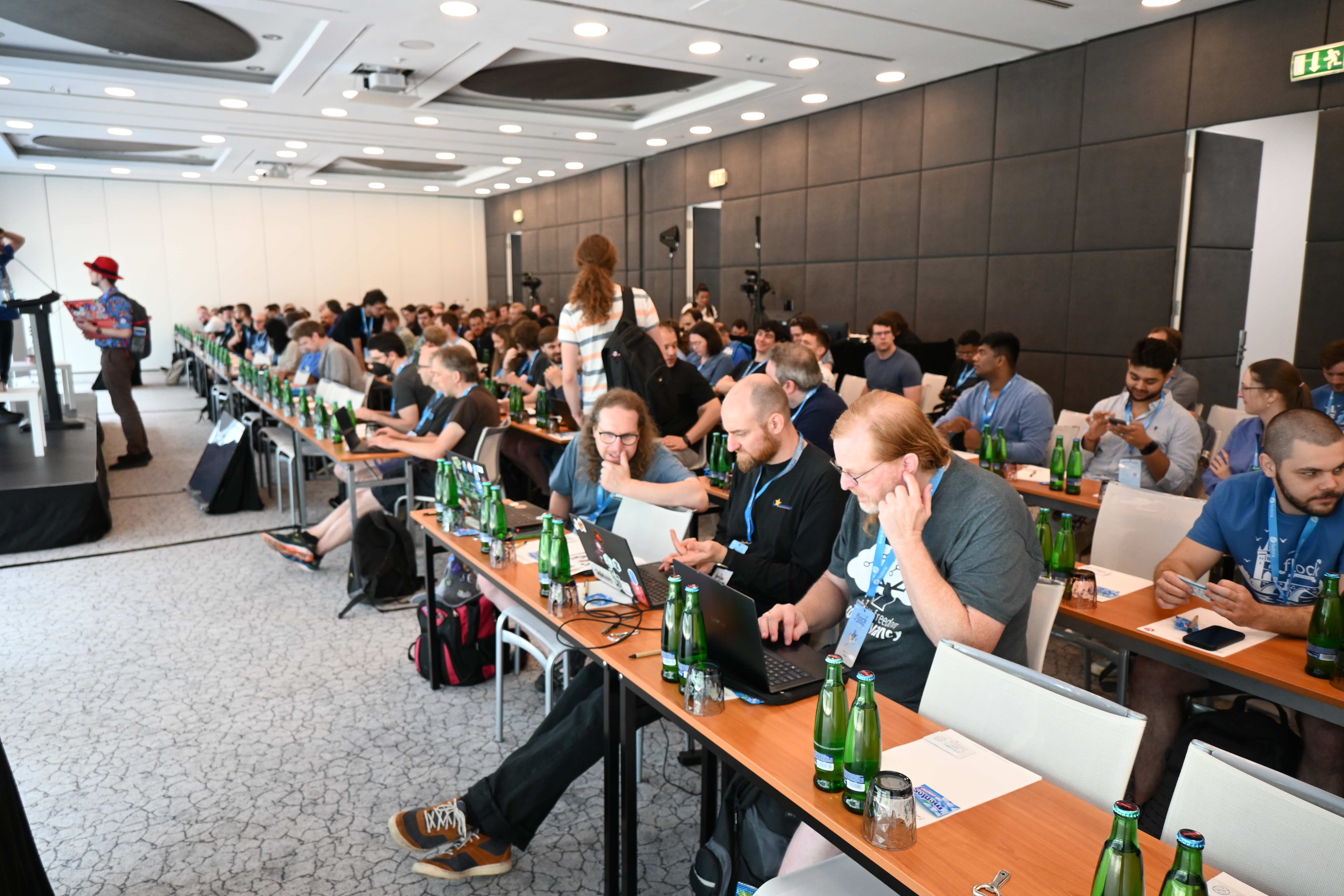First Day At Flock
The first day at Flock on June 5th turned out to be even better than I had imagined. There were so many people, and the venue’s interior was beautifully designed, creating a lively and welcoming atmosphere. I had the chance to talk and connect with a lot of people, and I was pleasantly surprised by how genuinely curious everyone was about what I’m working on. Starting conversations with strangers felt effortless, and I quickly found myself making new friends. Throughout the day, I always felt welcomed and never faced any difficulties. And, to top it all off, the food was absolutely fantastic, with so many options to enjoy.
First Session of Flock 2025
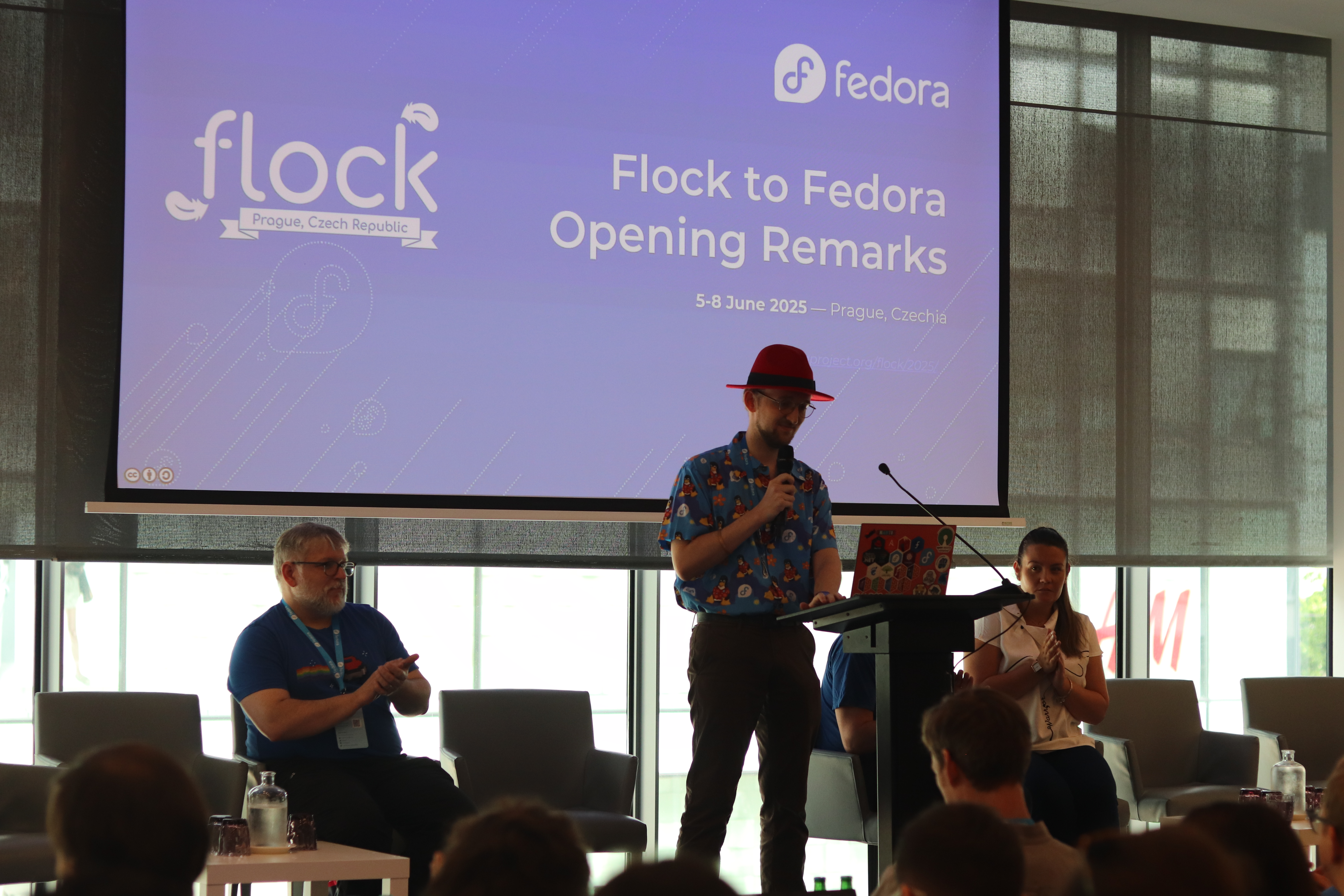
By Justin Wheeler, Aoife Moloney, Matthew Miller & Jef Spaleta
The Flock started with this session, it’s a good thing I came to the venue so early. The venue had one big hall, which can be divided into four parts for conducting sessions in each. There was announcement for vacating the room after 1pm and encouraging people to volunteer. and some other essential information were discussed before starting sessoions.
At that moment, I realized I was sitting behind Ankur Sinha, though I didn’t notice it until I saw his laptop screen open to his Pagure profile. I leaned over and asked, “Are you Ankur Sinha?” He replied, “Yes, I am. How are you? You’re Yashwanth, right?”
It was a truly memorable experience because Ankur was the person who onboarded me to the Fedora Project, it wouldn’t have been possible without his help. I struggled at first to get started, but he consistently checked in on me and guided me until I was able to contribute to the project I was passionate about. Meeting him in person and having a face-to-face conversation was very emotional for me.
After the refreshment break, I saw Justin Wheeler, who was busy managing various areas. I took the opportunity to talk to him. It was a new experience to speak with someone I had only interacted with in virtual meetings before. Talking to him in real life was really great. He was one of the people who helped me get a Fellowship in the Fedora Project, and I’m truly grateful to him.
FPL Exchange
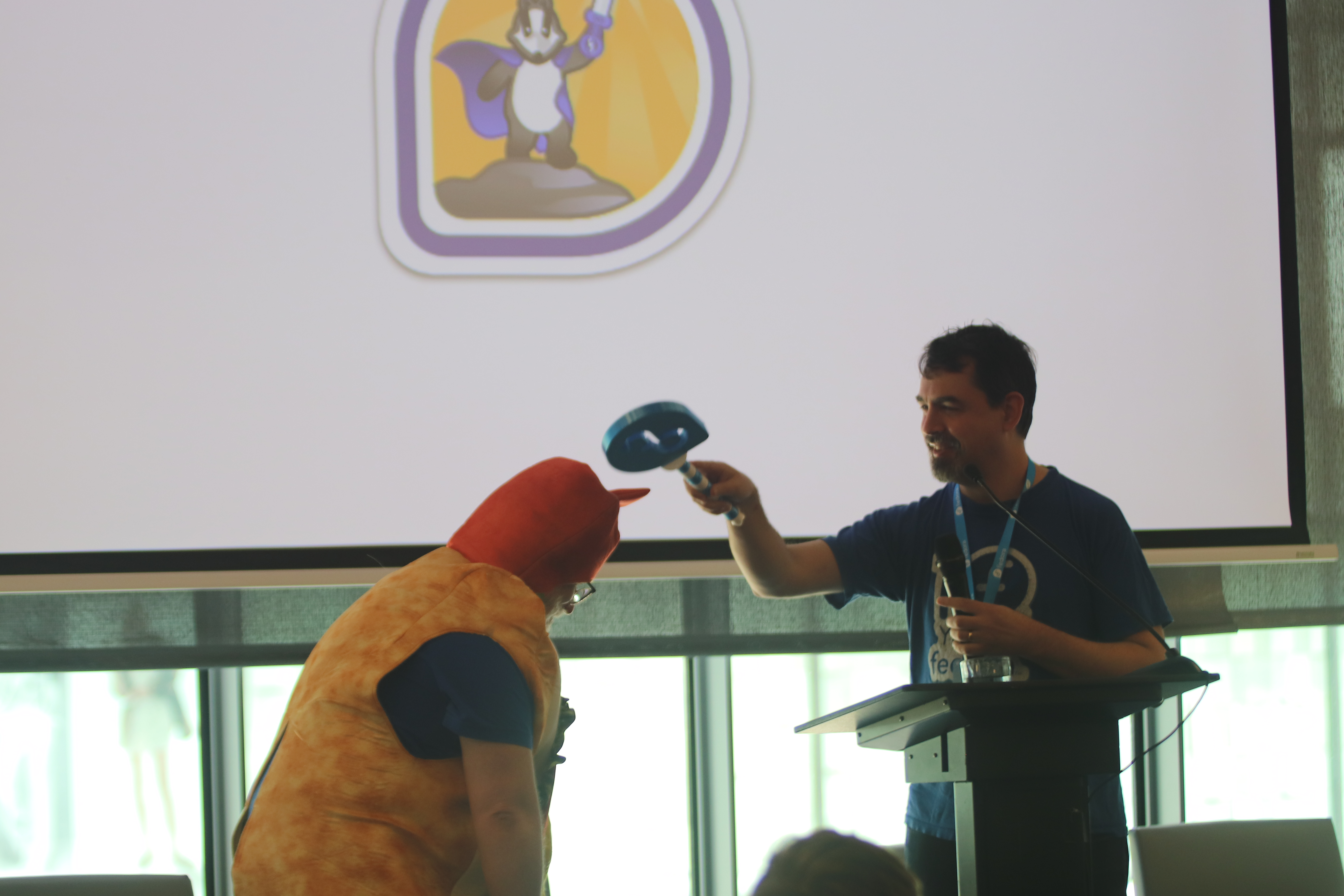
By Matthew Miller & Jef Spaleta
Matthew Miller served as the Fedora Project Leader (FPL) for almost 11 years, and I didn’t expect that the Fedora Project would now have a new FPL, Jef Spaleta. Even though I’ve only been actively involved with the Fedora Project for a little over a year, it still felt quite emotional for me.
During his talk, Matthew shared his journey as FPL and spoke about transitioning to a managerial role at Red Hat, which I found really interesting.
For me, this was one of the best sessions at Flock. It was my very first time attending an international event (and only my second conference overall), and to witness such an important leadership change in my very first Flock made the experience extra special. With a new FPL, Fedora will be going through some restructuring, and I’m really looking forward to seeing how things evolve.
FESCO Q&A
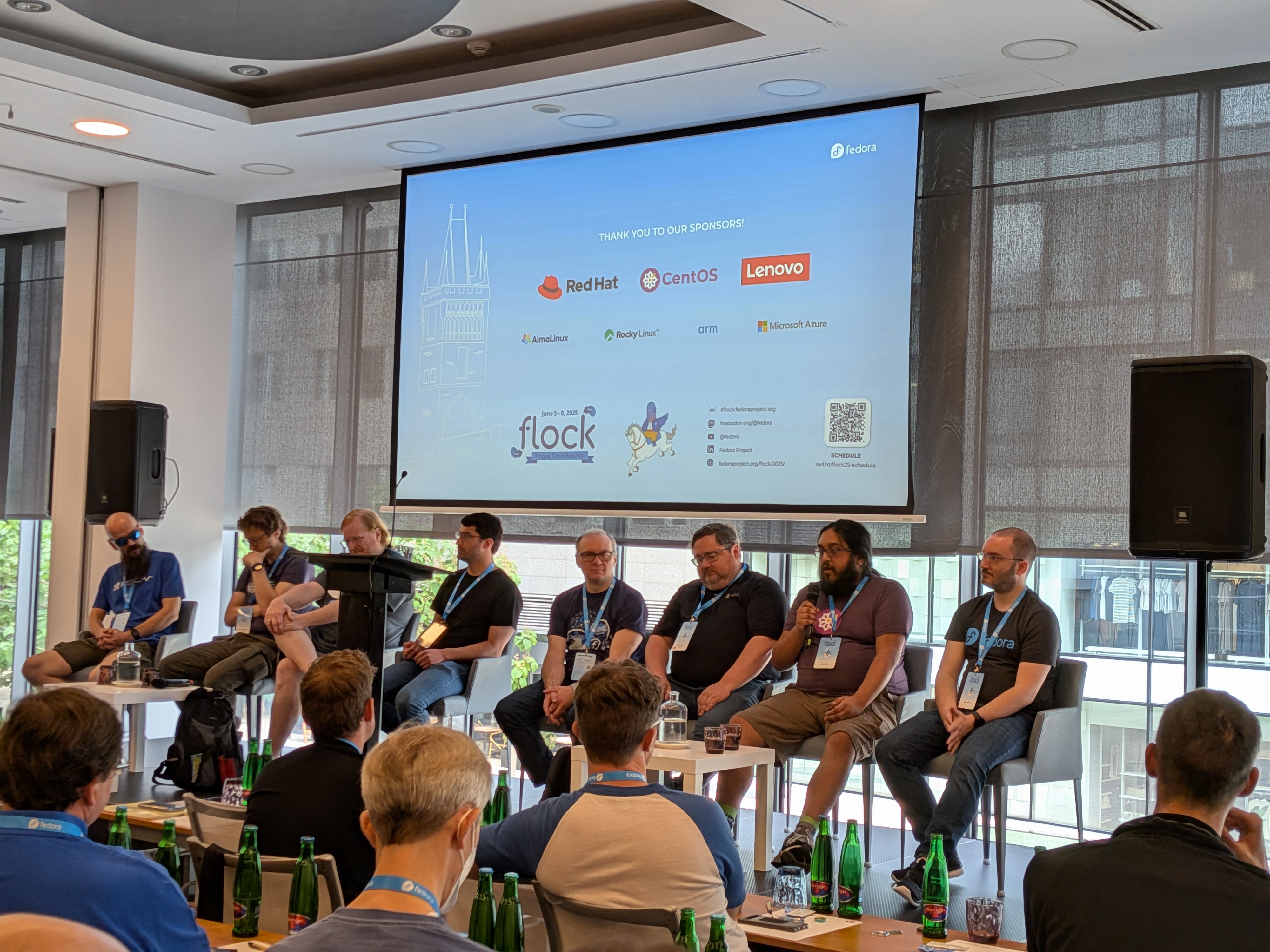
By Neal Gompa, Fabio Valentini, David Cantrell, Stephen Gallagher, Zbigniew Jędrzejewski-Szmek, Fabio Alessandro, Tomáš Hrčka & Kevin Fenzi
This session takes place every year during Flock, where the members of FESCo share their plans for the upcoming year, discuss them with the audience, and take questions as well.
Thoughts About Fedora Project’s Path in AI
There was also some discussion about AI and the direction FESCo plans to take with it. Kevin and David made it clear that they don’t intend to use AI everywhere, since that would defeat the purpose. Instead, they emphasized that it will only be used where it is truly necessary, ethical, and efficient.
Tomas Hrcka also shared his thoughts, saying he believes that self-hosted AI is a better approach. According to him, the Fedora Project, as a community, should focus on deploying AI solutions using its own data and infrastructure. He expressed optimism about this direction and sees Fedora moving towards adopting self-hosted AI in the future.
Stephen Gallagher added his perspective, making it clear that he supports AI tools only in ways that assist humans in their workflows. He stressed that he is against the idea of AI replacing humans and also spoke about the appropriate levels at which AI could provide support.
Zbigniew shared his views on AI in Linux technology development. He pointed out that in order for Fedora to retain its position as one of the leading Linux distributions, it must remain open to embracing new trends, such as AI, that are here to stay.
Neal Gompa spoke about accountability, emphasizing that a computer cannot be held responsible for human mistakes. He addressed the trend of companies replacing people with AI, pointing out that cost reduction is only a one-time benefit and that such an approach will eventually lead to many failures. Instead, he insisted that AI should be used as an “additive force” rather than a “reductive force,” and that we should position it in a way that augments human abilities instead of replacing them. He talks about that we should reframe it a enhancement thing.
Fabio Alessandro humorously started by saying that bringing AI tooling or toolkits into Fedora is such a great idea that we should do it tomorrow, or even today, as if it could be done effortlessly. However, he was very particular about ensuring that AI respects data privacy and is implemented in a safe and responsible manner.
Discussions on 2028 Strategy
There’s this question about Fedora Project 2028 talkked bby Jef Spaleta & Matthew Miller and the question is about whether the FESCo ever thinks about it in their day to life.
Neal Gompa kicked things off humorously, saying, “Oh boy! You don’t ask the easy questions, do you?” He went on to explain why certain things don’t always align with FESCo’s overall role in day-to-day operations.
David Cantrell followed up by saying that he does think about these issues, particularly since he comes from the engineering representative council team. However, he admitted that it can still be difficult to align with FESCo. According to him, FESCo deals with highly technical matters and discusses them in great depth, often covering nearly everything. While he feels that much of the work broadly aligns, he also acknowledged that, at the end of the day, it’s not always a direct alignment.
Stephen Gallagher pointed out that FESCo should be seen more as a “tactical body” rather than a “strategic body,” since it’s the Fedora Council that sets the overall strategy.
Zbigniew shared his thoughts, saying that while Fedora is doing well on the technological front, it is still struggling with community growth. He mentioned that it would be much better if there were more contributors, especially new ones, joining the project.
Kevin added to this by saying that FESCo functions more as a “reactive” body than a “proactive” one. According to him, FESCo responds to what is happening in the community and moves forward once there is collective interest or demand, rather than acting simply because a proposal exists.
This session continued for 60 minutes, and these couple of topics were the most interesting to me
Forgejo Talk
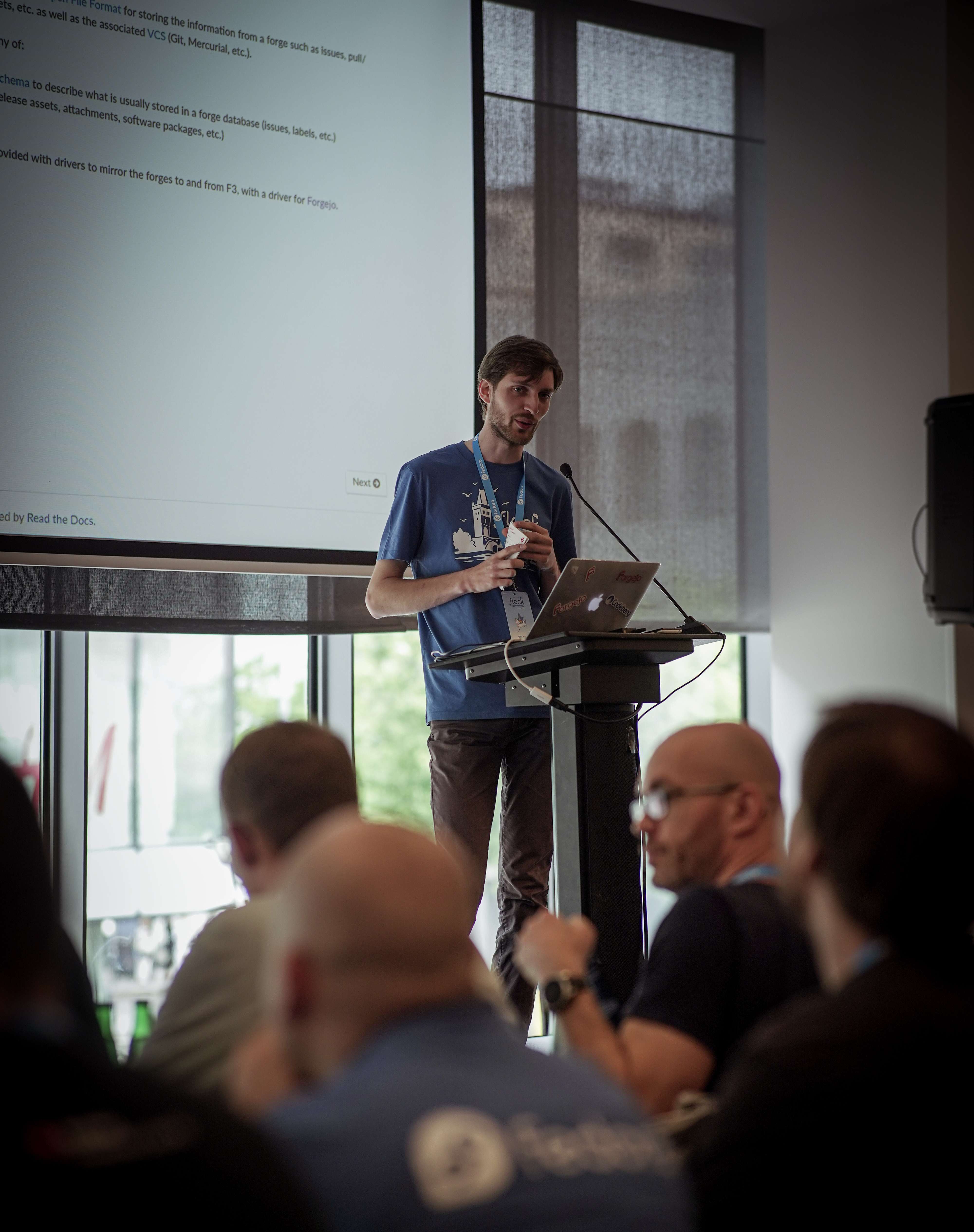
By Otto Richter
This was the most interesting session for me to attend, especially because I’m contributing to the Fedora Project’s Forgejo(downstream), and upstream Forgejo as well. It was great and insightful. I got some good ideas about what the Forgejo folks are working on, the areas where they might need help, and the features they have or are developing. I learned about the history of Forgejo, how it forked from Gitea after Gitea became a for-profit company, and how Codeberg came into existence.
He also talked about Forgejo Actions, which are similar to GitHub Actions but with some differences. Their goal was to make Forgejo Actions familiar to users rather than creating something entirely new from scratch. Forgejo Actions run on VMs that contain almost all the software needed to execute the actions.
He discussed features like dependencies in issues, making pull requests from the command line without having to create a branch or fork a repository.
At one point, he asked who would not use Forgejo for software development, and some people raised their hands. He explained that he has been working on user research to improve Forgejo and make it more accessible to all kinds of users, rather than just being a developer-friendly hosting platform.
Bazzite Talk
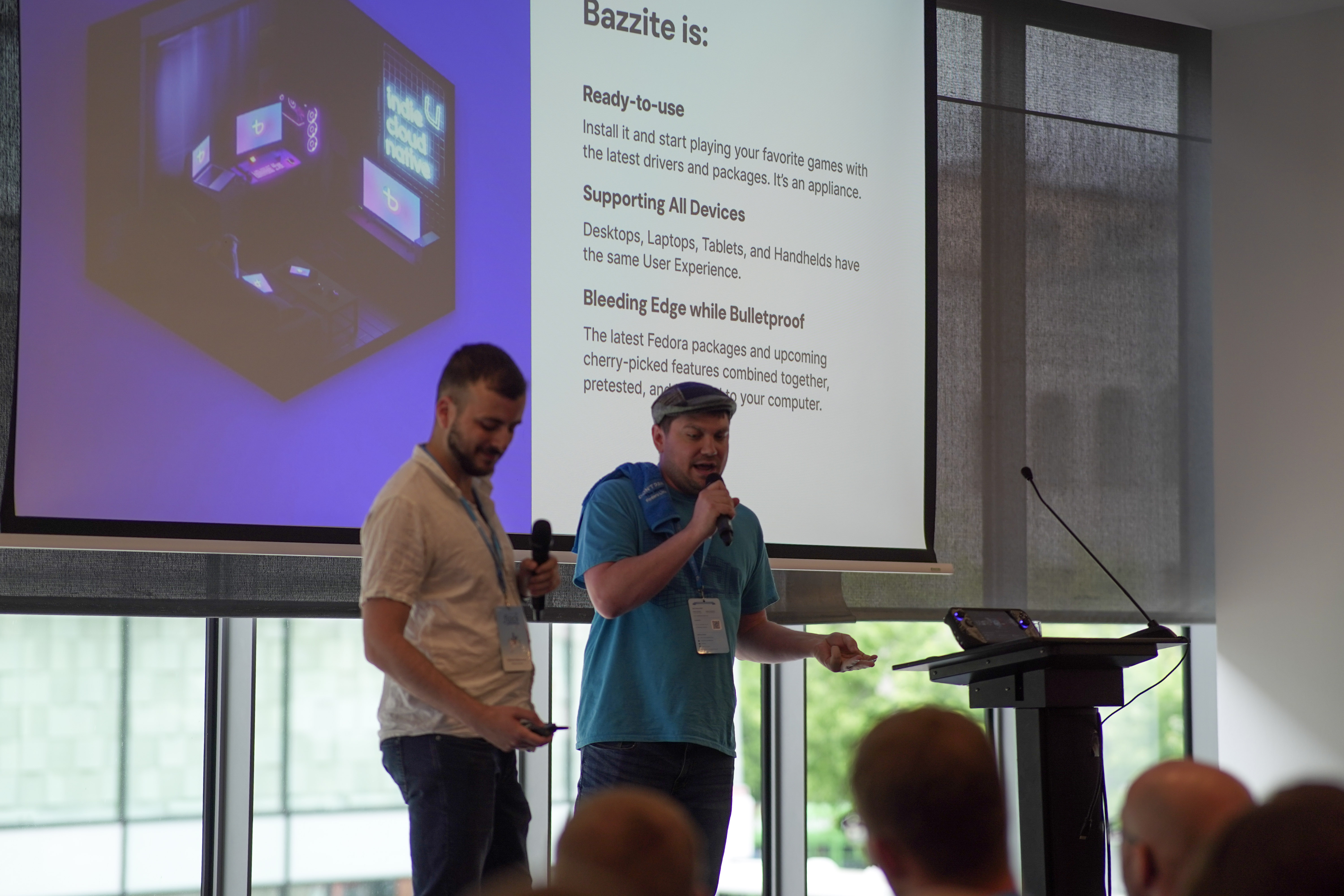
By Noel Miller and Antheas Kapenekakis
This was one of the interesting sessions to attend, well, obviously, it was about gaming!
He talked about how Bazzite came into existence as a community-driven gaming platform aimed at providing a seamless and optimized Linux gaming experience. They chose Fedora Linux as the base for Bazzite because of its stability, cutting-edge technology, and strong open-source community, making it the best decision to be a downstream project of Fedora Linux. He also shared some exciting future plans for the project as well.
Lunch With Mentors & Friends
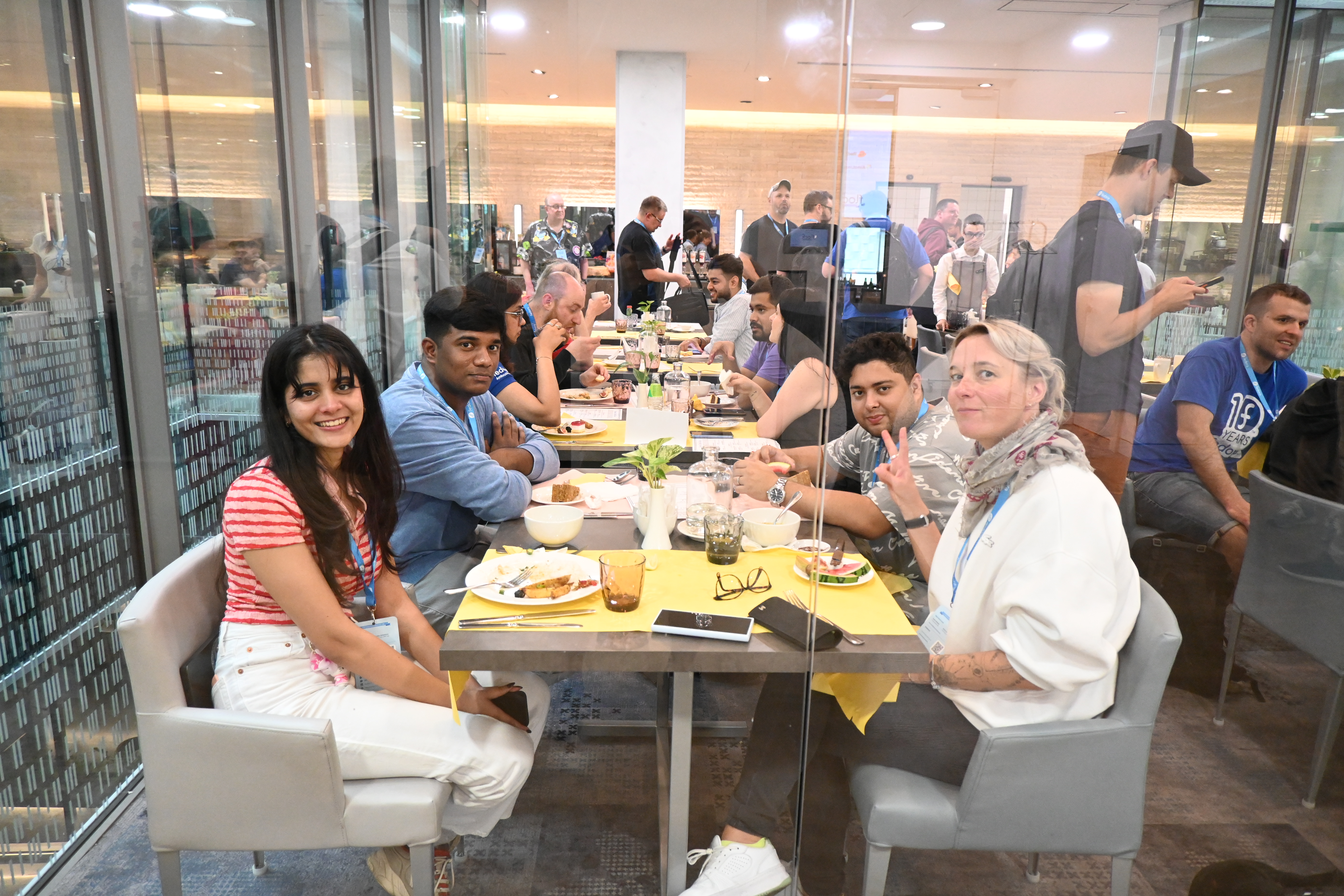
Lunch with Julia Bley, Sumantro Mukherjee, & Nikita Tripathi
This was one of the best experiences for me at Flock. I had the opportunity to have lunch with some amazing professionals who shared really useful information about job hunting, preparation, and interviews. They also spoke about their personal interests, and their journey which made the conversation even more engaging.
Nikita didn’t know me, so she asked for an introduction. I shared everyone how I got started with open source, how I joined the Fedora Project, and how I began contributing to the Community Operations team and how I eventually shifted to contributing to the Fedora Infrastructure team and more.
One particularly memorable moment was when Nikita Tripathi told that she had received a job offer from Meta, completely out of the blue. I wasn’t expecting it, and it was wonderful news. Knowing that I have friends in such prestigious companies gave me hope and reassurance that I’m moving in the right direction with my career with open source and learning in the right direction which I honestly like doing it.
I’ve been contributing mainly out of curiosity and genuine interest. Having recently graduated, I’m happy to see that I am progressing both in terms of knowledge and my career path.
Towards the end of lunch, Nikita suddenly felt nauseous, apparently due to the fish served during the meal. I didn’t eat the fish myself because it lacked flavor and seemed like it had just been boiled without seasoning. I even took it away to avoid any further discomfort.
Post-Lunch
Tomas Hrcka introduced me to Otto Richter, and we discussed Forgejo and its future plans. Tomas left after a while, and I spent most of my time talking with Otto about Forgejo, contributions, studies, and more. I thought I wouldn’t be able to maintain the conversation, mainly because I’m not very confident in English. But interestingly, Otto was a really nice person, and we talked a lot. I even skipped several sessions. Time flew by, and before I knew it, I had missed almost all the sessions in the second half of the day. Sadly, I didn’t take a picture with Otto that day.
With My Mentor in Fedora Project Fellowship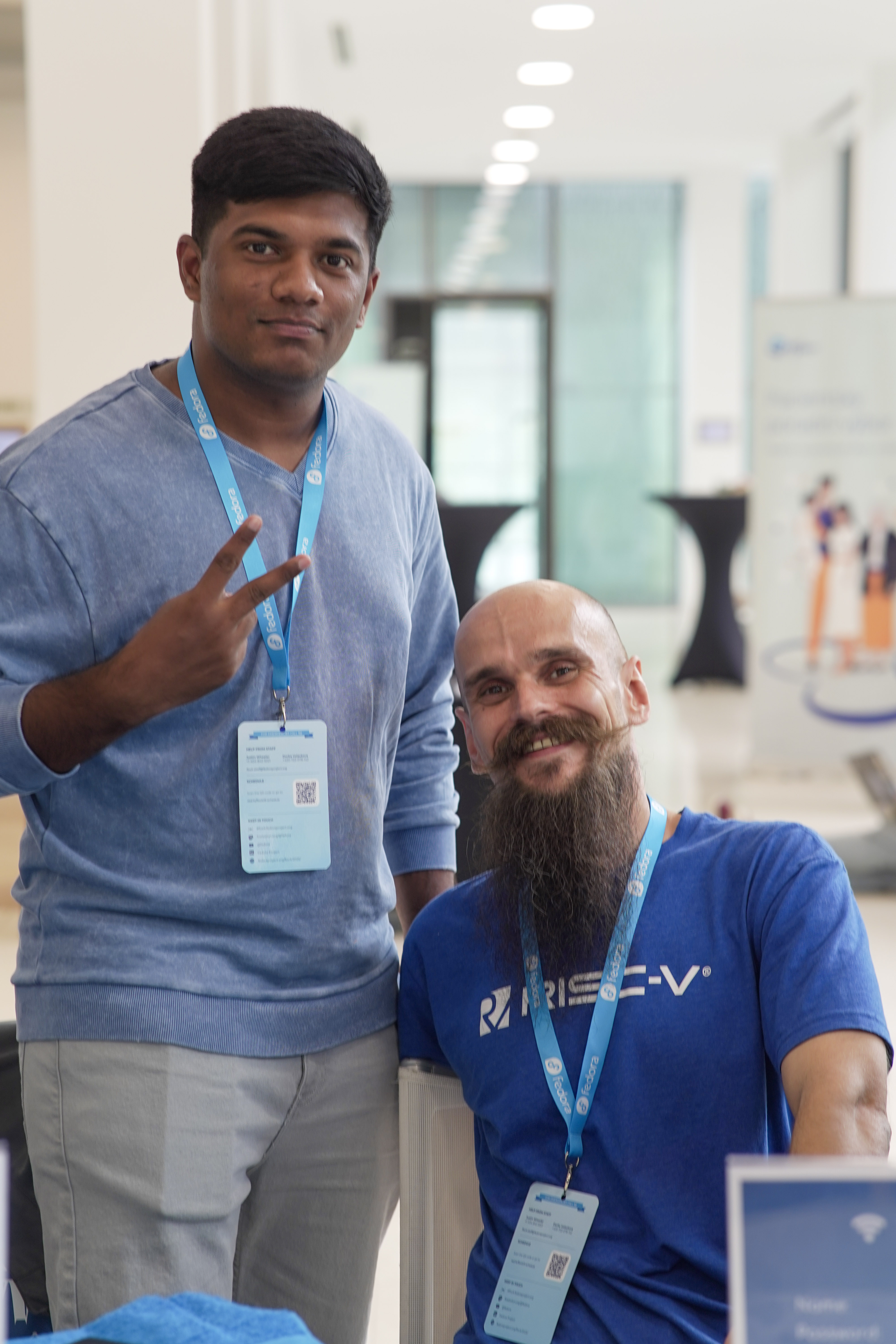
End of Day 1 in Flock
After a while, I regrouped with Akashdeep and some others, and we went back to the hotel. I was hanging out with Akashdeep, so I went to his room. There seemed to be a team dinner happening, and I wasn’t sure if I was invited, so Akashdeep booked a cab for me. The cab eventually arrived, but I had to cancel it. Just after booking the cab, I went down to the hotel lobby to wait for it, when Tomas messaged me and told me to come to dinner with the CLE folks.
He asked his manager whether I could join the dinner, and the answer was yes! So, I cancelled the cab and went with Tomas, Fabian, Michal, and the other CLE folks to the dinner location. We sat at a long dining table, and many dishes arrived. However, Akashdeep, Sumantro, and I were waiting for the bird meat. I also had my first non-alcoholic beer. I wouldn’t say it tasted good; it was sour but somehow okay. I guess beer only tastes better the more you drink it! :P
Eventually, I finished my dinner, but some people were still talking, so I went with Sumantro. I told him about the problems I was having with my debit card, and he gave me some insights, especially about cards that work internationally. He also explained how to get tram tickets. Because my debit card was not working at that time.
However, I chose to walk back to my hotel. It was about 7 kilometers, but since I’m used to walking 4 kilometers from my home to the bus stand for most time, I thought I could manage the walk. I strolled through the city, admiring the architecture, the people, the culture, and some other places. It was worth it, but also kind of tiring and painful to walk that far in one go!
I walked for around more than two hours before I eventually reached my hotel.
